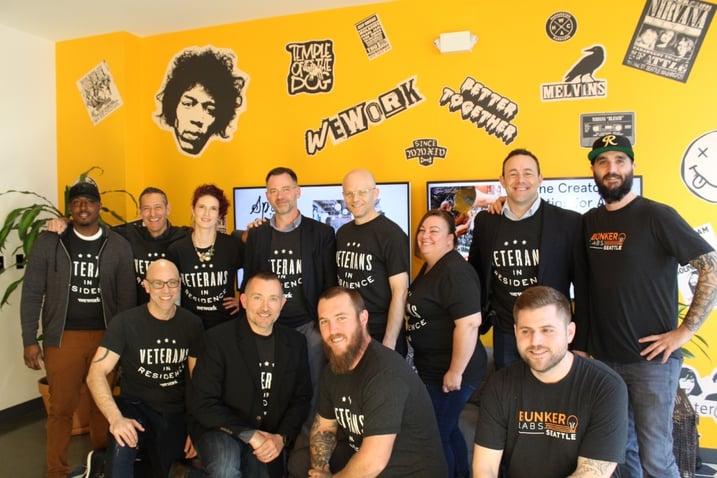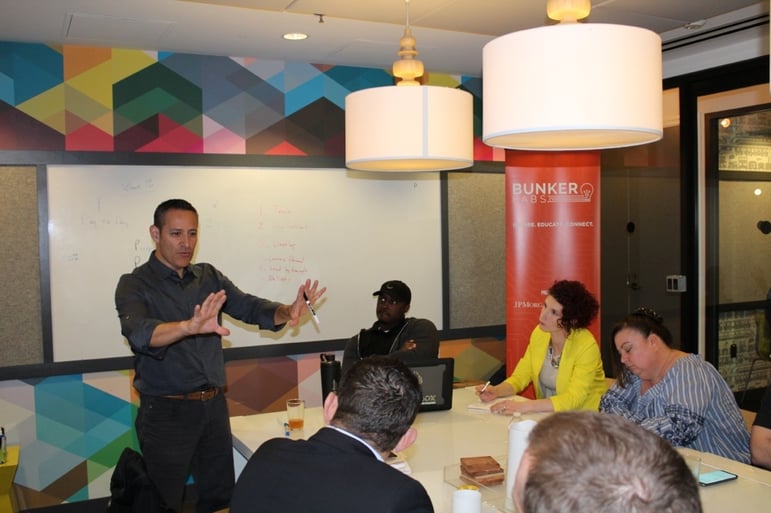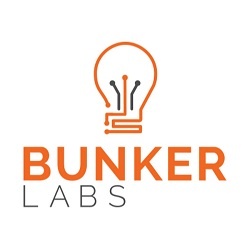We hope you enjoy this post from our friends at BunkerLabs!
Greg Adams was a Special Forces Team Leader in western Afghanistan. He was responsible for coordinating different organizations, from government to NGO to business, from US to Afghanistan to NATO partners. His main mission was to keep people safe by supporting a Common Operating Environment. After separating from the Army in 2011, he created a new mission. Greg founded Stabilitas, an A.I. powered technology startup in Seattle, WA, that uses machine learning to gather threat intelligence data from around the world and analyzes it in real time to help keep people safe. Greg, like so many new Vetrepreneurs, is leveraging his military experience to solve a real, private sector problem, fulfill his dream, and power the American Economy.

PG President Bobby Herrera (back row, second from left) with the Veterans at the Seattle BunkerLabs Campus
How do we get other veterans and military spouses to follow in Greg’s footsteps and become incredible entrepreneurs?
That's the question Bunker Labs is trying to answer. We're a non-profit that works with veterans pursuing entrepreneurship nationwide. We have chapters in local communities across the country that provide educational programming, access to resources, and a thriving local network to help military veterans and their spouses start and grow businesses.
When Veterans Return Home
After World War II, veterans were quickly absorbed into American society because so many Americans had served in the military. As a result, 49% of veterans came home to start a business. Today, the numbers are a lot less. While 25% of veterans want to start their own business, the reality is only 6% of those coming off active duty will actually do it.
America needs business growth and veterans are well suited to do it. They are young, smart, risk-tolerant digital natives. They are entrepreneurial, globally minded, and experienced in solving complex problems.
But the challenge is for America is to better integrate veterans into business and entrepreneurial environments and utilize their skill sets effectively. To achieve that, we need more highly connected communities, where people of all backgrounds have access to the resources they need to start businesses.
Below are five key steps we have taken to achieve integration that can be used as a blueprint that any organization can use to engage and assimilate the veterans in their business communities.
5 Tips to Energize & Support Veterans & Military Spouses Entrepreneurs
The entrepreneur journey is often a lonely one and can be especially challenging to veterans. The moment our sons and daughters stepped off the bus into the loving arms of their drill sergeants (yah, right), they were drilled to rely on each other. They were also drilled to live by the creed that no one Soldier, Sailor, Airman/woman, or Marine is stronger than the entirety of The Team. This sense of brother/sisterhood builds an inherently strong tribal belonging that is the cornerstone of the success of our armed services. After transitioning from the military into civilian life and entrepreneurship, the lack of a “tribe” combined with lack of direction to the resources and network needed, can be uniquely challenging to veterans. The following steps are how communities can help in creating an ecosystem where veterans thrive as entrepreneurs.
1. Focus on building entrepreneurial ecosystems.
When local communities create a culture that encourages and supports entrepreneurship, veterans are supported to pursue their ambitions. Building ecosystems means building a strong network at the state level for founders and their support networks. We get excited when we see these networks come to life. Take when we at BunkerLabs co-host events with Operation Code, a veteran organization that helps train veterans as coders. Together, we unite business and technical talent which hopefully leads to relationships and new companies.
Here in Seattle, we strategically placed our office in the heart of the startup community, CoMotion Labs, on the University of Washington Campus. This partnership provides a front row seat in the epicenter of entrepreneurship and innovation which helps to empower our aspiring veteran community and demystify the possibility of success.
2. Strive to make ecosystems broadly inclusive.
Successful entrepreneurs can be all kinds of people, regardless of gender, race, socioeconomic status, etc. Overall, 15% of DOD active-duty military personnel are women. Racial and ethnic minority groups make up 40% of Defense Department active-duty military. But right now, this military diversity does not transfer to the startup/entrepreneur communities. The best way to ensure we bridge that opportunity gap is by partnering with local veterans’ organizations, industry leaders, academia and policy makers to a create a culture that is welcoming to all people.
3. Activate and energize talent.
Veteran unemployment is declining, but high turnover speaks to veterans feeling that their first job isn't a good fit in terms of skill or culture. This is best solved by educating business owners and recruiters on military culture and how the skill sets veterans gain while serving, can directly transfer into civilian occupations. When we first met Populus Group President Bobby Herrera, we explained the importance of veteran business owners like him to self-identify and highlight their veteran status to empower and inspire other veterans. This is important within the Populus Group organization, but also to create a community that's welcoming to other veterans. We were overwhelmed with excitement a few weeks later, when visited Populus Group, to see that veterans within the company are identified and celebrated with toy soldiers over their desks.
 Bobby talking with the Veterans at Bunker Labs, Seattle
Bobby talking with the Veterans at Bunker Labs, Seattle
4. Ensure experts in entrepreneurship are driving the discussion, not experts on Veterans.
We work with veterans to realize their future, not focus on their past. So we encourage discussions to be oriented around the ways to cultivate entrepreneurship. We hope to help Veterans develop this new entrepreneurial part of their identity, while still honoring their military past.
5. Make decisions about supporting veterans with veterans in the room.
Include veterans in the process whenever possible. This helps engage them more meaningfully as a part the group, empowering them as a contributor. They must be present in the decision-making.
These steps have been critical in achieving our mission to help the veteran-turned-entrepreneur. Since the launch of our Seattle offices in May 2017, we prioritized altering the community understanding of veteran culture from the negative stereotypes to highlighting the massive positive impact of our veteran community. We did this by creating meaning full and lasting relationships with entrepreneurship service organizations (ESOs), veteran service organizations (VSOs), industry leaders, academia, and policy makers.
One of those alliances was with WeWork across 10 cities, including here in Seattle. This partnership allows Bunker Labs to provide office space and networking events to members of our Veterans in Residence (ViR) program. The ViR program supports veterans and military spouses whether they are starting a new project and building a business, or expanding their network and finding their next career. It offers the community and services they need to find their tribe and create their life’s work.
Our nation needs job growth, and nearly all new jobs created are attributable to new businesses, according to the Kauffman Foundation. More than one million men and women will return from military service by 2022. Let’s honor them in our communities across the U.S. by committing to integrate them fully into American society. Let’s put entrepreneurial ecosystems in place and ensure they are working to help veterans realize their dreams.
The article was brought to you by the Bunker Labs Seattle team.
If you enjoyed this post, you may also like:
Celebrating a New Veteran Story This 4th of July
Honoring Veterans (Part 1): A Family Legacy of Military Service
Celebrating Veterans (Part 2): What I Learned From My Time in the Army



 Populus Group
Populus Group Ejay Oravecz
Ejay Oravecz
Leave a comment